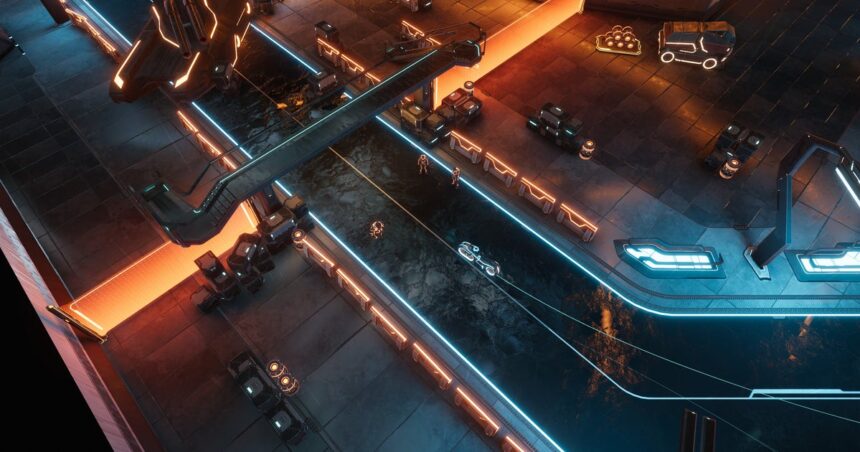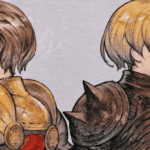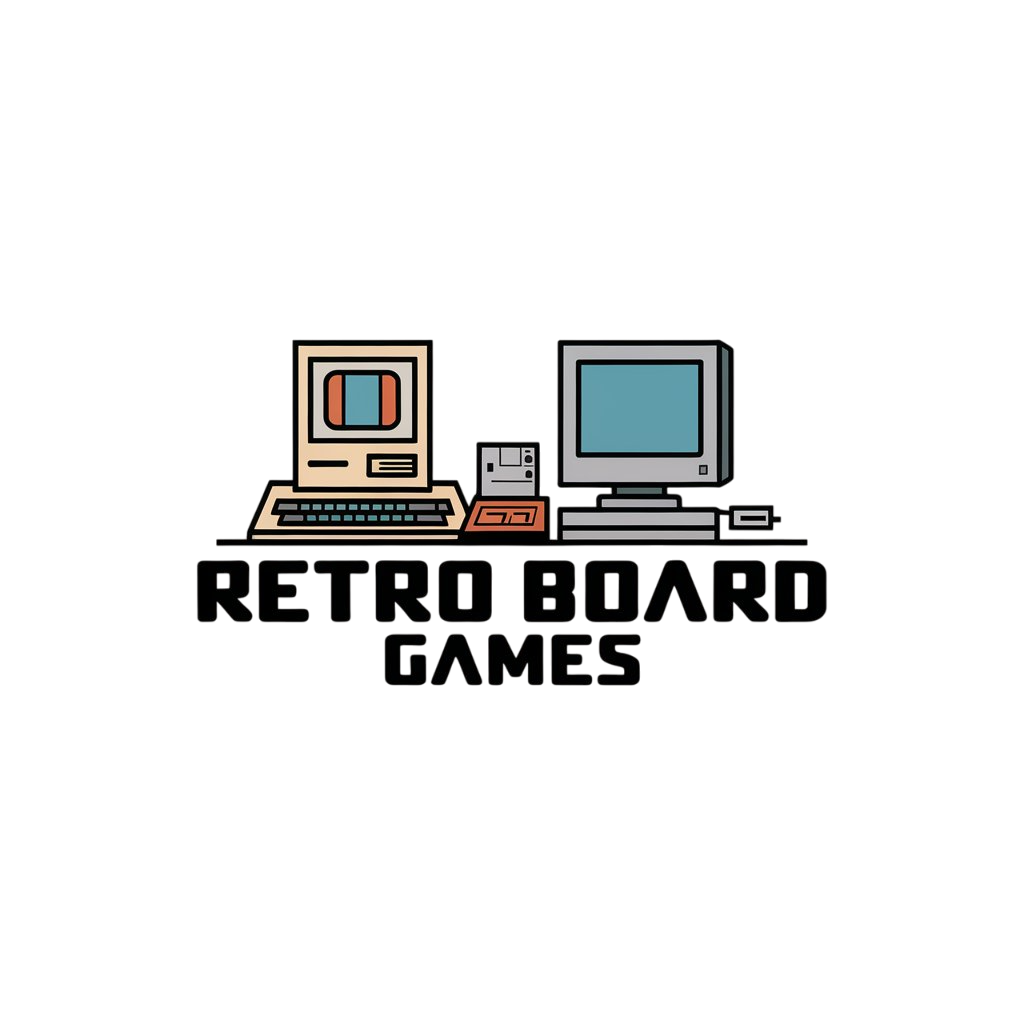A smart and inventive RPG-lite, and a worthy entry in the TRON canon.
In a world where the dividing line between a handheld game and a Big Telly game is entirely down to personal preference, it might seem redundant to single out TRON: Catalyst for praise as being particularly good on portables. But it is. It has the feel of a really good PSP or DS era tie-in game. It’s engineered for compactness and bite-sized play sessions, with simple controls, short quests, and concise story beats. And its compactness is reflected in the price. There’s no mistaking Catalyst’s modest, indie budget. Its scope and ambition, however, are anything but modest.
I should back up here for a second and clarify that Catalyst’s penchant for on-the-go play doesn’t amount to a game that is second-rate. Its story, which is delivered here in a visual novel style similar to Bithell Games’ earlier TRON: Identity (which, as it turns out, works much better as an elaborate prologue to this than it does as a standalone game), is a high-stakes road trip across the vast Arq Grid. It unfolds in a manner similar to an old Bioware game. Picture something like a streamlined Jade Empire and you’ve got it. The game batters through chapters and chews through locations at a decent pace, with limited optional side-quests and just enough length on the leash to make you feel like you’re exploring when you’re really just going where you need to.
There aren’t any elaborate CGI movies to sit through, and there isn’t really any choice and consequence stuff. (Again, there’s enough dialogue selection to make you think it’s in there, but it really isn’t.) That might seem odd if you played the studio’s previous TRON game or indeed its earlier forays into This Sort Of Thing. Subsurface Circular, for example, was a single-location science fiction game that told its entire story in an elaborate dialogue system, it was about androids toppling a human empire and you only ever saw the inside of a train carriage.
TRON: Catalyst tells a similar kind of story about an overstretched system of control that is being challenged by an underclass of people – programs – who are fed up. I need not draw the contemporary parallels. What it doesn’t do is give you any real freedom to influence that narrative. Instead, it gives you a big ol’ to-do list and some cool TRON stuff to get it done with.
As you would expect, or demand, Catalyst puts the TRON toy box to good use. Combat and long-distance traversal are satisfyingly dealt with via your trusty Identity Disc and Light Cycle. And given that it’s the thing you’ll spend most of your time doing, I’m pleased to report that the combat system feels very nice and snappy. You can fling your ID Disc at enemies or just thwack them with it. You can use it as a block shield to deflect disc or melee attacks. But, this being a game from 2025, you’ll mostly be parrying and rolling.
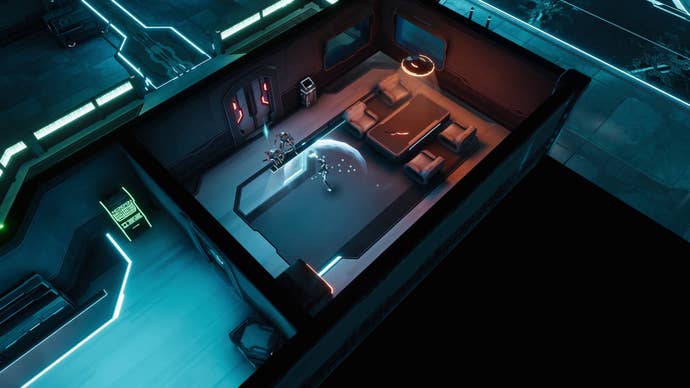
A simple RPG-lite skill tree allows you to improve on these basics – things like extending the parry window and making your disc attacks ricochet between enemies. As you progress through the game, more elaborate mechanics become available, such as the ability to “steal” an enemy’s weapon for a short time (or, far more usefully in my experience, turn one into a concussive blast that knocks back mobs).
I’m more or less describing every hack-and-slash game on the market, but the execution here is impeccable, both in terms of how combat feels in the hands and also in how it deftly weaves the TRON mythos into every conceivable aspect of the game. You could argue that without the license, Catalyst would be a fairly by-the-numbers experience. Consider how Arkham Asylum wouldn’t be as good if it didn’t have Batman in it, for example. But this is a moot point. Because Batman is in it.
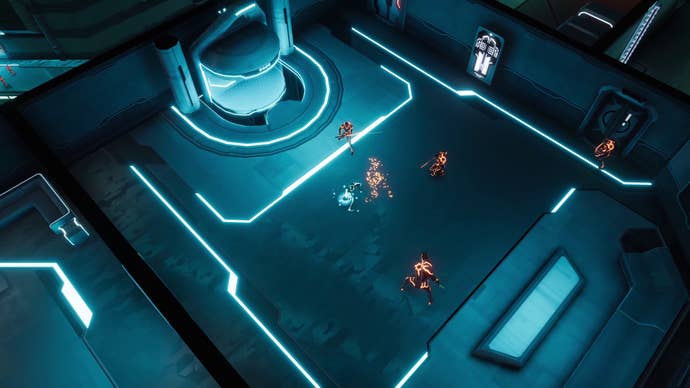
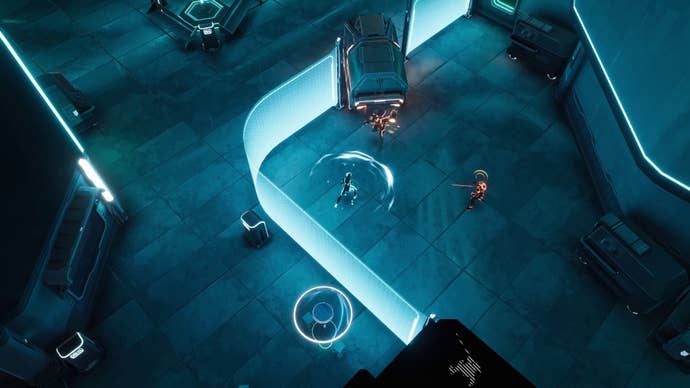
TRON: Catalyst has Light Cycles in it. And they’re fun to weave around the isometric city map when you aren’t clattering into scenery (a user error, admittedly). In the early game your bike is, well, just a bike: a way of getting around the city of Vertical_Slice (ffs Bithell) quickly. Later, as the story fans out into ever grander and increasingly apocalyptic spaces, vehicular combat becomes a proper game of Light Cycles – that is, you vs a group of similarly bewheeled enemies, and your offensive capabilities reduced to speed, cunning, and a light wall that you can eject out of your back end and hopefully trick other bikers into smashing into.
Catalyst actually makes the modern version of Light Cycles work: the version where contenders drive in proper curves and the whole thing turns like a real bike, instead of the impossible digital right-angles of the original concept. This was supposed to be a cinematic interpretation of a 1980s arcade game, remember, and updating it to remove the sharp corners kinda kills it. At least, I thought it did, until the Bithell Games version of it actually made sense as a chaotic form of bike combat in the digital desert. It takes it away from the arena grid and turns it into a sort of neon Mad Max.
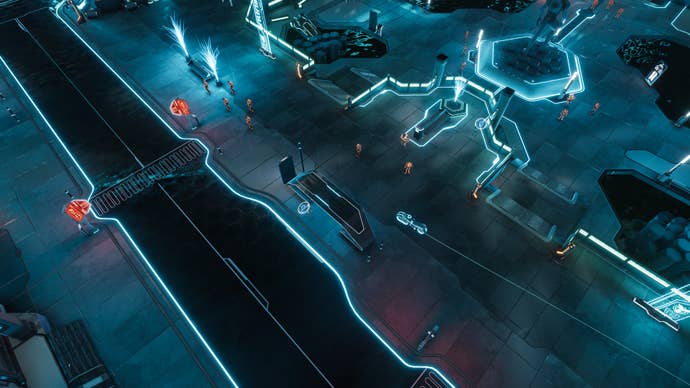
There’s a reason that Catalyst doesn’t use the original form of Light Cycles: Bithell Games’ wing of the TRON-verse occurs well after TRON: Legacy, the forgettable second movie. And as such Catalyst is sadly forced to base all of its big design cues and visual language on what was basically a crap film with good bits (Michael Sheen’s scene-chewing as a Bowie-esque club owner and Daft Punk doing the soundtrack, in that order).
It does wonders within those restrictions. The gloomy teenager’s bedroom version of TRON from the 2010 film, with its smoke-machine haze and dark-mode palette, was a far cry from the original movie’s weird primer-grey sets and fluorescent fire-blanket costumes. Neither film is a cinematic masterpiece, but at least the original had an inchoate sense of wonder about it. Probably because it was unwittingly inventing the future of filmmaking and trying to give the inner workings of computers – things that, in 1982, were mostly used for payroll and stock management – an exciting narrative. That’s why the villain is just, like, a guy in a suit (as all villains actually are).
It would be a lie to say that TRON: Catalyst brings the franchise back to its wonkier, sillier, roots. What TRON: Catalyst does do with endearing confidence is play within that mythology – and its relationship with the real-world language of computing – to imagine new possibilities with the TRON world. The most immediate of these is time travel: each chapter of the game occurs in a specific slice of system time called a loop. Your character, Exo, can create and perceive changes that occur outside of these loops, and reset time to an earlier state that undoes certain actions, but carries over things like your character development, pieces of code (keys, bits of intel), and shortcuts you’ve unlocked. For a game built around time loops, it is extraordinarily mindful of making you repeat yourself too often.
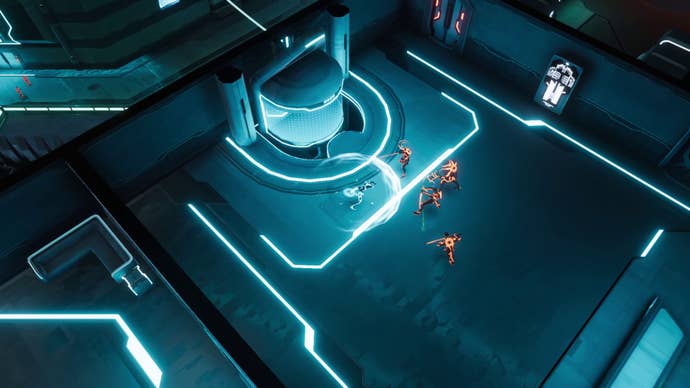
There are plenty of opportunities to bank your progress – unlocking different spawn points, for example – that mitigate the annoying part of resetting the world state, and let you focus on the interesting parts. These might include watching new consequences play out in place of old ones, or obtaining access to new, previously boarded off areas. This is where the Metroidvania influence really comes into play. New abilities open new doors, and old encounters are given fresh perspectives. Dying resets the loop, but also replenishes your health bar, of which you get one per cycle.
But to be clear, it’s not a system you can play around with a la Deathloop. For one thing, the game always telegraphs when looping will be useful, and without any immersive sim elements in play, it’s not like you have anything to experiment with. What it does is make the traditional death mechanic a lot more interesting than simply a thing that robs you of progress if you cock up. It’s certainly not the only game that plays with death/rebirth in this way, but it is a no-brainer for a TRON mechanic, as “glitching” to an earlier “restore point” feels like a very natural thing to be able to do in that universe.
So, tonally, visually, it is absolutely a spin-off of TRON: Legacy. But it charts a much different path, and is set in a new, distinct computer system – the Arq Grid – with its own culture and its own issues. In the lore, it’s set up by Flynn (Jeff Bridges’ character in the original) as a refuge for ISOs. That is: programs that have emerged within the system, not coded by a human programmer. Their very existence is deemed sacrilege in their original grid, sort of understandably. Imagine if you knew for a fact that God was real, and was also Jeff Bridges, because he lived up the road, and then imagine that some people started appearing who had nothing to do with him or his design. They used to burn people just for having weird moles.
In the films, these ISOs were driven to near extinction by genocide. In these games, the survivors have built a new society in a different system, one which is now – hundreds of cycles later – collapsing in a thin allegory of climate change. But it’s also brimming with a new conflict between ISOs, who believe in human users, and a new type of emergent program, Automata, who reject the idea of intelligent design and deny the existence of human users entirely.
Again, I don’t have to draw the real-world parallels here, but these allegories aren’t perfect, and the source material is sufficiently removed from the real news that it would be unfair to derive any specific message from the writing beyond the simple truth that power corrupts, and that oppressed people have a great tendency to resist those doing the oppressing. And also Light Cycles are cool.
Like most of Bithell Games’, er, games, the experience is much more than the sum of its parts. Smart, evocative writing with a dash of humour coupled with competent game design that nails the fundamentals. And given how the entire operation as it stands today only exists because of a quirky, inventive platformer about a bunch of geometric shapes inhabiting an errant computer system, it’s of little surprise that the studio’s first proper crack at a TRON game completely understands the assignment.
TRON: Catalyst is a sleek and polished labour of love that revels in its license and building on it in interesting ways. It feels good, and it looks good: especially if you’re lucky enough to be playing on an OLED device, on which its beautiful clean neon accents really pop spectacularly. Granted, this is more a product of the source material but it’s worth mentioning because it’s a deeply satisfying part of a deeply satisfying package. But more than that, it’s extremely ambitious. It may be a budget release, but there’s nothing thrifty about its vision for the continuing adventures of these aggy, angry little computer people.
Code for TRON: Catalyst was provided by the publisher.


